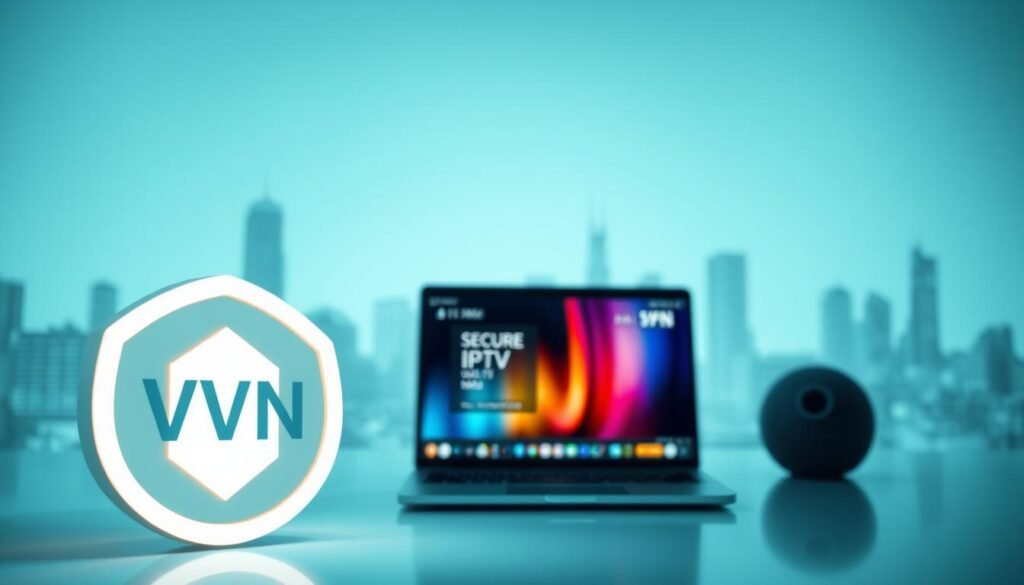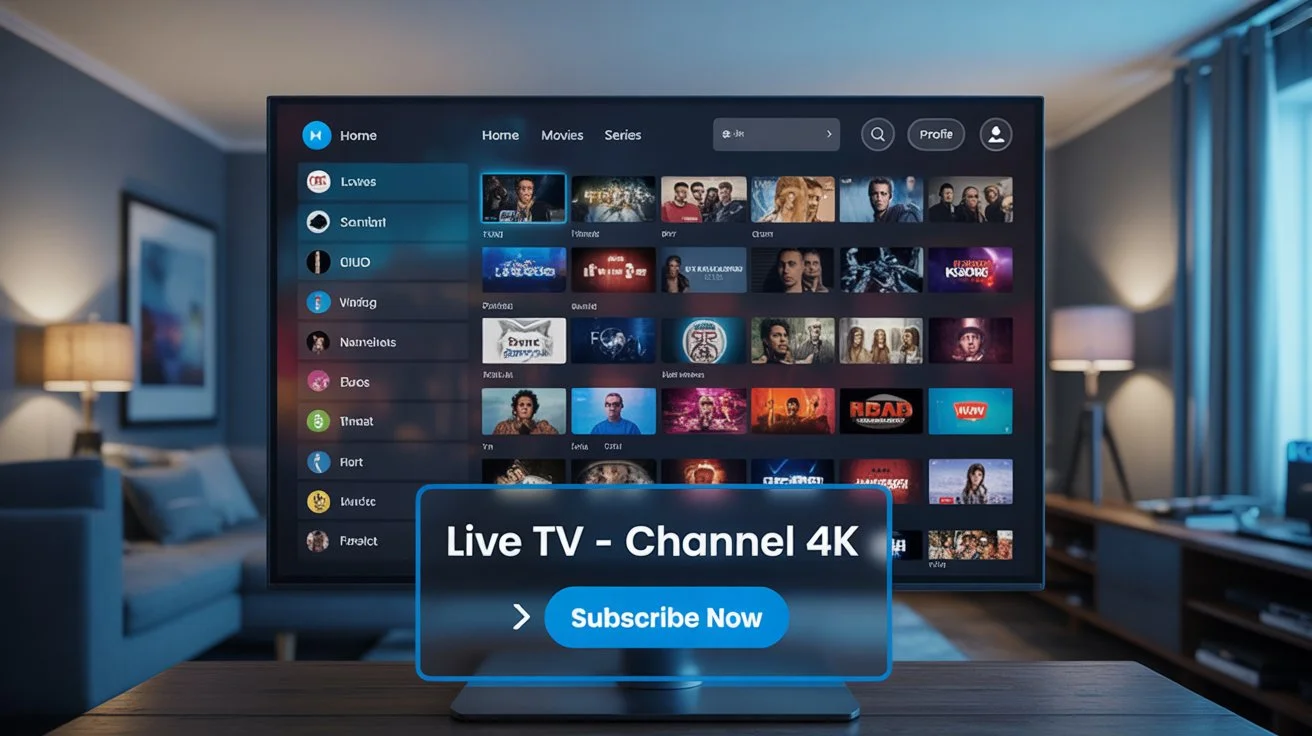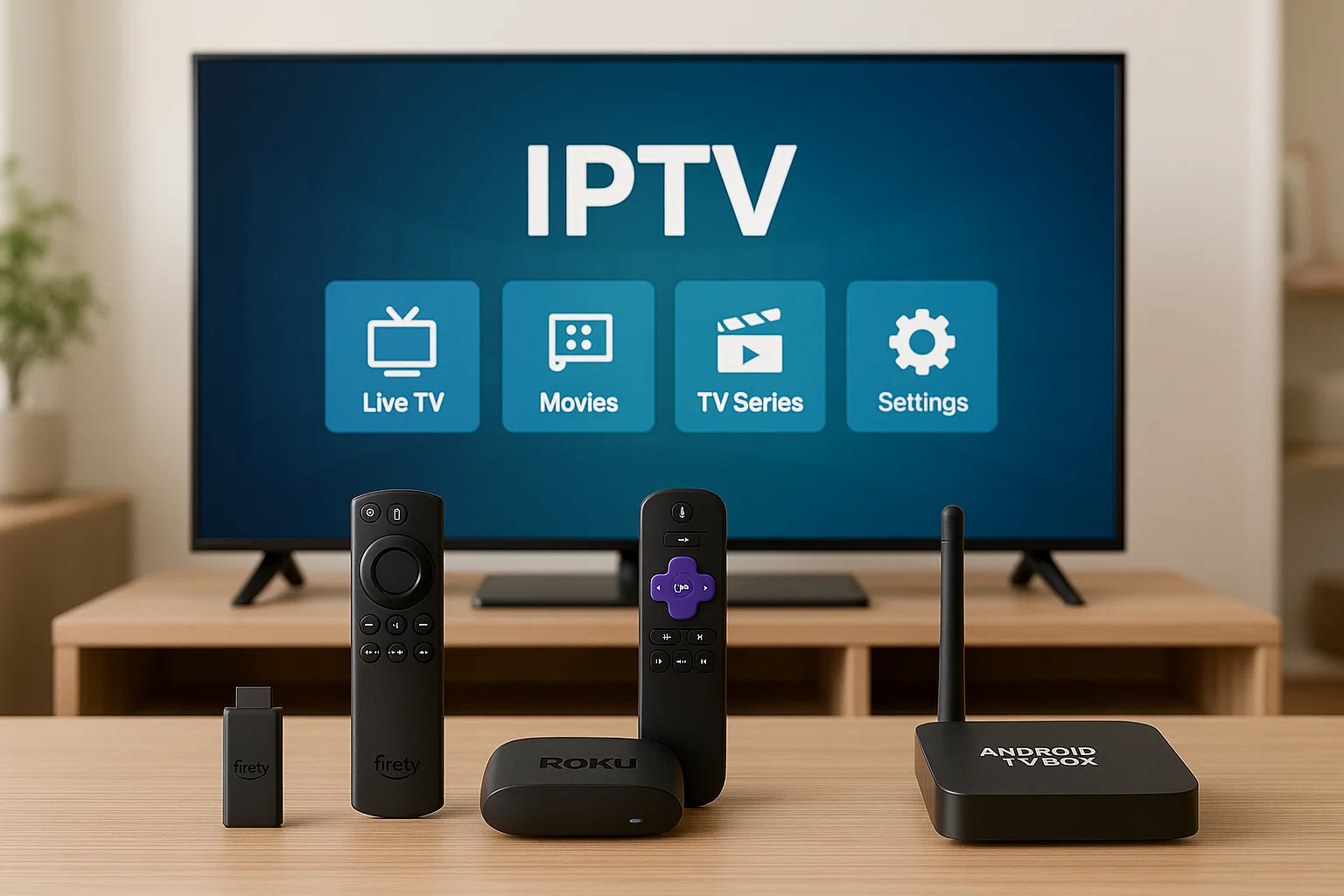Internet Protocol Television (IPTV) has changed how we watch media. It offers many channels and on-demand shows over the internet. Services like Netflix, BBC iPlayer, and Hulu are examples of IPTV providers. They make it easy to watch your favorite shows and movies.
But, IPTV users face a big problem: geo-restrictions. These limits what content you can watch based on where you are. That’s where VPNs come in. They let you hide your IP address and watch content you can’t normally see.
Using a VPN makes your streaming privacy and online security better. It makes watching shows safer and more fun. If you want to watch international content or keep your identity safe while streaming, a VPN is key.
Key Takeaways
- IPTV providers offer a wide range of channels and on-demand content over the internet.
- Geo-restrictions can limit access to content based on your location.
- A VPN can help mask your IP address and access geo-restricted content.
- Using a VPN enhances your streaming privacy and online security.
- A VPN is essential for accessing international content and protecting your identity while streaming.
- VPNs for Iptv
Why You Need a VPN for IPTV Streaming
A VPN is key for IPTV streaming to keep your online life private and safe. Streaming has become a big part of our entertainment. But, it brings challenges like geo-restrictions and privacy worries.
Protecting Your Privacy Online
Without a VPN, your online actions can be watched by your ISP, government, or hackers. A VPN makes a encrypted connection between your device and a VPN server. This keeps your data safe and your identity hidden online. This is very important for IPTV streaming, where you might see content that’s sensitive or not allowed.
Bypassing Geo-Restrictions
Many IPTV services are only available in certain places. VPNs hide your real IP address with one from another country. This lets you see content from that region.
This is great for watching international content or sports events not in your area. By bypassing geo-restrictions, you get to see more IPTV content. This makes your streaming better.
Enhancing Streaming Speed
Some VPNs can also make your streaming faster by stopping ISP throttling. ISPs might slow down your internet for streaming. A VPN encrypts your traffic, hiding your streaming from your ISP. This might make your streaming speeds better.
To get the best streaming speed, pick a VPN with servers for streaming. Also, choose one with a strong network. This way, you avoid geo-restrictions, keep your privacy, and stream smoothly.
How VPNs Work with IPTV Services
Using a VPN with IPTV adds a layer of protection. It keeps your online activities private. This is done through encryption, IP masking, and optimizing your connection.
Encryption and Data Security
VPNs make your IPTV streaming safer with encryption. Encryption scrambles your internet traffic. This makes it unreadable to anyone who might intercept it, like your ISP and hackers.
By encrypting your data, VPNs create a secure tunnel for your IPTV streams. This protects you from data breaches and cyber threats. It’s especially important when using IPTV services with weak security.
Masking Your IP Address
VPNs also mask your IP address. They route your internet traffic through a VPN server. This hides your original IP address, making it seem like you’re accessing IPTV from the VPN server’s location.
This not only boosts your privacy. It also lets you bypass geo-restrictions. You can access content not available in your area.
Optimizing Your Connection
VPNs can also optimize your connection for IPTV streaming. They reduce ISP throttling, or slowing down, of your internet. This is because ISPs often slow down streaming traffic.
By encrypting your traffic, a VPN makes it hard for your ISP to detect streaming. This can prevent throttling and give you a smoother viewing experience.
Many VPNs also have servers optimized for streaming. These servers can make your IPTV experience even better. They provide faster connection speeds and more reliable connections.
Top VPNs for Unblocking IPTV Content
To enjoy uninterrupted IPTV streaming, you need a top-notch VPN. With many VPN services out there, picking the right one can be tough. We’ll look at some of the best VPNs for accessing digital content.

NordVPN: Reliability and Speed
NordVPN is great for IPTV streaming because of its reliability and speed. It has some of the fastest connection speeds out there, says speed tests. This means you can watch your favorite shows without any buffering or lag.
ExpressVPN: User-Friendly Experience
ExpressVPN is known for its user-friendly interface and easy experience. It’s easy to use, making it simple to connect to the best servers for IPTV. With servers in many places, ExpressVPN helps you get past geo-restrictions easily.
Surfshark: Affordable and Effective
Surfshark is a good choice if you want an affordable yet effective VPN. It’s special because you can have unlimited simultaneous connections. This makes it perfect for group IPTV streaming. Surfshark offers great value for your money, balancing price and performance.
When picking a VPN for IPTV, think about speed, server locations, and how many devices you can connect at once. Choosing a VPN that does well in these areas will improve your digital content access. This way, you’ll have a better streaming experience.
Comparing VPN Features for IPTV
There are many VPNs out there. It’s key to compare their features if you love IPTV. You need to think about several things that affect your streaming.
Speed and Performance Metrics
The speed of your VPN is very important for buffer-free IPTV streaming. Look for VPNs with fast servers for streaming. Performance metrics like ping times and throughput are important for a good streaming experience.
A good VPN should not slow down your internet. Some VPNs, like NordVPN, offer fast and reliable connections for high-definition IPTV streaming.
Server Locations and Availability
Where the VPN servers are located is also very important. A VPN with many server locations can help you access geo-restricted IPTV content worldwide.
For example, ExpressVPN has many servers in different countries. This makes it easy to find a server for your IPTV content.
Simultaneous Connections
If you want to connect many devices to your VPN at once, look for a VPN that allows multiple simultaneous connections. This is great for families or people with many devices.
Surfshark, for example, lets you connect unlimited devices. It’s a great choice for families or people with lots of devices.
In summary, when picking a VPN for IPTV, think about speed, server locations, and how many devices you can connect at once. This will help you get the best streaming experience.
Setting Up a VPN for IPTV on Different Devices
To enjoy uninterrupted IPTV streaming, setting up a VPN on your devices is key. A VPN gives you an encrypted connection and lets you browse privately. It’s a must-have for anyone watching internet TV.
Installation on Smart TVs
Setting up a VPN on smart TVs depends on the TV’s OS. Most smart TVs let you install a VPN app from their app store. ExpressVPN, for example, has apps for many platforms, making it easy to get started.
After installing, connect to a server for the best streaming. This boosts your streaming speed and keeps your connection safe.
Configuring VPN on Streaming Devices
Devices like Roku, Amazon Fire TV, and Google Chromecast can use a VPN too. You can set up the VPN on your router or download an app for the device. This makes it easy to get started.
- Download the VPN app on your streaming device.
- Log in with your VPN credentials.
- Choose a server optimized for streaming.
Using VPNs on Smartphones and Tablets
Setting up a VPN on phones and tablets is easy for streaming IPTV anywhere. Most VPNs, like ExpressVPN, have mobile apps. You can connect with just a few taps.
With a VPN, watch your favorite IPTV content securely and privately. Choose a server that’s good for streaming for the best experience.
By following these steps, you can enjoy smooth and secure IPTV streaming on all your devices.
Streaming Protocols Best Suited for IPTV
Choosing the right protocol for IPTV streaming is key. It affects how data moves over the internet. The right choice ensures a smooth viewing experience.
UDP vs. TCP: What’s the Difference?
UDP and TCP are the top streaming protocols. UDP is best for IPTV because it’s fast and cuts down on delay.
TCP is more reliable but can cause buffering. For IPTV, UDP’s speed is crucial.
Importance of Low Latency
Low latency is vital for IPTV. It means video streams in real-time without big delays. Latency is influenced by protocol, network, and server distance.
Protocols That Maximize Streaming
Some VPNs, like Surfshark, use WireGuard, IKEv2, and OpenVPN. WireGuard is fast and secure. For IPTV, pick a VPN with various protocols for the best streaming.
- WireGuard: Known for its speed and security.
- IKEv2: Offers a good balance between speed and stability.
- OpenVPN: Provides robust security and is widely supported.

Knowing about streaming protocols helps you choose the right VPN for IPTV. This choice lets you access geo-restricted content securely.
Legal Considerations When Using VPNs for IPTV
Using VPNs with IPTV brings up legal questions. It’s key to know the legal side of using a VPN for IPTV. This helps you enjoy your favorite shows and movies safely.
Copyright Laws and IPTV
Copyright laws differ by country. They stop you from sharing or watching content without permission. Using a VPN for IPTV that streams copyrighted stuff without a license can lead to legal trouble.
Key points to consider:
- Make sure the IPTV service has the right licenses.
- Know the copyright laws in your country and where your VPN servers are.
- Remember, using a VPN doesn’t make illegal things legal.
The Risks of Using Free VPN Services
Free VPNs might seem good, but they’re risky. Many free VPNs track your activity, sell your data, or add ads. For IPTV, using a free VPN can hurt your online safety and privacy.
“Free VPNs often compromise on security and privacy, putting your data at risk.”
To stay safe, get a reputable paid VPN service that cares about your online safety.
Tips for Safe Streaming
To stream IPTV safely and legally, follow these tips:
- Pick a VPN that doesn’t log your activity and is known for protecting privacy.
- Make sure your IPTV service has the right to stream what you’re watching.
- Keep up with the copyright laws in your area.
By being careful and protecting your online safety, you can have a safer IPTV streaming experience.
Using a VPN for IPTV can make your streaming better by keeping you safe online. But, it’s your job to make sure you’re following the law.
Common Issues with VPNs and IPTV
Using a VPN with IPTV can boost your streaming privacy. But, it comes with some challenges. VPNs help get past geo-restrictions and keep your internet safe. Yet, some problems can happen when watching internet television.
Troubleshooting Connectivity Problems
One big problem is when IPTV doesn’t work right with your VPN. If you’re having trouble connecting, try a few things. First, change to a different VPN server. Sometimes, a server is too busy or has technical issues.
Also, try using the IPTV website instead of the app. Some apps might not work well with VPNs.
Another tip is to turn off GPS on your device if you’re using a VPN on a mobile. Some IPTV apps might check your location and block access.
Avoiding Buffering and Lag
Buffering and lag can ruin your streaming. To avoid these, make sure your VPN has servers for streaming. Some VPNs have special servers for streaming that help avoid buffering and speed up your stream.
Also, check your internet speed. A slow connection can cause buffering, even with a VPN. If your speeds are slow, think about getting a faster plan.
Dealing with VPN Blocks
Some IPTV services block VPN IP addresses to enforce geo-restrictions. If your VPN IP is blocked, try a different server. Many VPNs have lots of IP addresses, and switching can fix the problem.
Using a VPN that tries to avoid these blocks can also help. Some VPNs have special features to sneak past streaming service blocks, making your viewing smoother.
Conclusion: Choosing the Right VPN for IPTV
Choosing the right VPN for IPTV streaming is important. You need to think about speed, server locations, and how many devices can connect at once. It’s key to match these needs with what you want for watching digital content.
Key Considerations
Look for VPNs that are safe, fast, and easy to use. NordVPN, ExpressVPN, and Surfshark are good choices. They offer strong security and fast speeds.
Staying Ahead
To get the most out of IPTV, keep up with new VPN tech. This way, you can keep watching your favorite shows without any problems.
By picking a VPN that fits your needs and staying current, you’ll have a great IPTV streaming experience. It will be safe and smooth.



